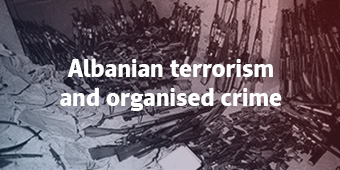

Introduction. The Serbian negotiating team is firmly committed to the view that the future status of Kosovo and Metohija must be the result of an agreement between the legitimate representatives of Serbia and Montenegro, on the one hand, and those of the Kosovo Provisional Institutions of Self-Government, on the other hand. The representatives of the international community play a very important role in the process; their mediation should contribute toward finding a peaceful, comprehensive and lasting solution.2
A negotiated solution to the future status of Kosovo and Metohija is in every respect preferable to any kind of imposed solution. Only a negotiated solution creates the preconditions and provides an opportunity for peaceful coexistence between Serbs and Albanians (as well as the other ethnic communities in the province), makes economic and social recovery possible, and contributes to the historical reconciliation necessary to establish a common European perspective for all. A negotiated solution also has the advantage of being situated between two unacceptable extremes—the status Kosovo and Metohija had in the period 1989-1999, and independence, i.e., the creation of a new Albanian state.
The Serbian negotiating team holds that a realistic proposal for such a negotiated solution can be achieved through direct negotiations, as suggested in the 18 May 2006 letter of the President and the Prime Minister of the Republic of Serbia, who are also the co-chairmen of the Serbian negotiating team, to the Ministers of Foreign Affairs of the Contact Group countries, to Mr. Xavier Solana, the High Representative for the CSDP of the European Union, and to Mr. Martti Ahtisaari, the Special Envoy of the UNSG for the Future Status of Kosovo.
The position of the Serbian negotiating team is that the future status of Kosovo and Metohija must be defined as substantial autonomy within Serbia and the State Union of Serbia and Montenegro. This document lays out the key elements of such a solution.
The Future Status of Kosovo and Metohija in International Law
International guarantees of the sovereignty and territorial integrity of Serbia and Montenegro. The future status of Kosovo and Metohija, conceived as a broad autonomy with international guarantees, must be fully compatible with international law and the fundamental principles of the international order. This implies that the future status of Kosovo and Metohija must not infringe the sovereignty and territorial integrity of Serbia and Montenegro as an internationally recognized state, a member-state of the United Nations, and a member of other international organizations.
The future status of Kosovo and Metohija should fully conform to the fundamental principles and norms of the international community, as well as to the specific documents of the international community that affirm the sovereignty and territorial integrity of Serbia and Montenegro. Any settlement of the future status of Kosovo and Metohija that would go against the existing international law, infringing the sovereignty and territorial integrity of Serbia and Montenegro, could only represent an imposed solution, and as such would have to be declared illegitimate, illegal, and invalid by the relevant institutions of Serbia and the State Union of Serbia and Montenegro.3
General Agreement on the Future Status of Kosovo and Metohija. The political talks on the future status should be concluded by a general agreement which would be considered an international legal document. This Agreement would spell out all the essential features of the future status of Kosovo and Metohija, including both general principles and concrete provisions. The General Agreement would also specify the constitutional guarantees that would provide for the security of the Serbian and other non-Albanian communities (through decentralization as well as other institutional and legal guarantees). All parties to the Agreement would be bound to respect strictly its provisions.
The General Agreement should be in effect for a period of 20 years, with the possibility of extending its duration. Amendments to the Agreement could also be discussed at an earlier date with the consent of all interested parties.
The implementation of the future status defined by the General Agreement would be under international supervision. The security sector would be administered by an international force that would be given a new mandate.
(1) Participants, signatories and guarantors of the Agreement. The parties to the Agreement are Serbia and Montenegro, the PISG in the province, and the international community, i.e., the United Nations, whose representatives operate within a mandate granted by the Security Council. The Agreement must be accepted in its entirety by all three parties prior to its formal adoption. As subjects of international law, the signatories to the Agreement are Serbia and Montenegro on the one hand, and the United Nations, on the other. The signatories to the Agreement are at the same time its guarantors.
(2) The obligations of the UN under the Agreement. In addition to its role as a guarantor of the Agreement, the United Nations would have specific duties and responsibilities, primarily in the security sector. The UN would maintain its military presence, and to some extent also its police presence in the province. The military presence of the UN presupposes the complete internal demilitarization of Kosovo and Metohija. The UN police would have a general supervisory role with respect to internal security.
(3) Other features of the General Agreement. After the General Agreement is signed, the Security Council of the UN would adopt a new Resolution on Kosovo and Metohija. This Resolution would replace Resolution 1244 and confirm the status affirmed in the Agreement. Annual reports to the UN Security Council on status implementation would be instituted, with the possibility of modifying the modalities of the UN military and police presence (the number of soldiers and policemen, their rules of engagement, etc.)
The Future Status of Kosovo and Metohija: Constitutional Framework
General Solution. The General Agreement contains both general principles and concrete provisions that need to be enshrined in the Constitution of the Republic of Serbia and the new Constitution of Kosovo and Metohija. The new constitution of the province would thus be based on the General Agreement, reaffirming the obligations it contains, particularly those concerning the rights of the Serbian and other non-Albanian communities, including decentralization and other relevant institutional guarantees.
Substantial Autonomy. The Constitution of the Republic of Serbia would contain the following provisions defining the substantial autonomy of Kosovo and Metohija:
(a) Division of Competencies
• The province would exercise all competencies except those reserved for Serbia or the State Union of Serbia and Montenegro.
• The following competencies are reserved for either Serbia or the State Union, depending on the constitutional division of competencies between them: foreign policy, control of borders, monetary policy, customs policy, special customs inspections and control, final legal recourse in the protection of human rights, and the protection of Serbian religious and cultural heritage.
• Kosovo and Metohija would have full financial autonomy in the sense that the province would conduct its own public finances (taxation, public revenues and expenditures, including investment). The province could accordingly receive loans from international financial institutions and secure foreign direct investment.
• Certain forms of cooperation between Serbia and Kosovo and Metohija relating to the free movement of people, goods, capital and services would be constitutionally specified. Additional forms of cooperation would be established in sectors such as banking, the harmonization of fiscal policy, infrastructure, communications, etc. Such cooperation would contribute substantially to economic development and the process of European integration.
•Given the proposed division of competencies, the effective functioning of either the central or the provincial government does not require Kosovo and Metohija to be politically represented in the representative bodies of Serbia and the State Union.4
•In the field of competencies reserved for Serbia or the State Union of Serbia and Montenegro, the Kosovo and Metohija authorities would have the right to give recommendations to the relevant institutions of central government.
(b) Institutions of Kosovo and Metohija
• The constitutional powers of Kosovo and Metohija would be exercised through legislative, executive and judicial institutions.
• The Kosovo and Metohija parliament would be directly elected. A certain number of seats in the parliament would be reserved for the representatives of Serbs and other non-Albanian communities. When the parliament is considering matters that are of vital interest to the Serb community, including provincial legislation, no decision would be considered valid unless a majority of Serb representatives votes in its favour.
• The Government of Kosovo and Metohija, democratically elected in the provincial parliament, would exercise executive power.
•The judicial power in the province would be exercised by municipal courts, district courts, and the Supreme Court of Kosovo and Metohija. The Constitutional Court of Kosovo and Metohija would be entrusted with constitutional oversight. The Constitutional Court of Serbia is the court of final recourse in the domain of human rights. In the judicial cases involving the rights of Serbs or other non-Albanians, the composition of the judicial body should be ethnically diverse; international judges should also continue to sit in such cases for the foreseeable future.
(c) International Relations
•Kosovo and Metohija would have the right to maintain relations with states, provinces, regional and international organizations, provided that this does not require the status of a sovereign international subject. Such international cooperation must not be against the national interests of Serbia and the State Union of Serbia and Montenegro. Any international agreement resulting from such cooperation cannot be signed unless the Government of Serbia or the Council of Ministers of the State Union are properly consulted.
•The province could have direct access to international financial institutions, in accordance with the provisions of the Constitution of the Republic of Serbia that would make this possible. This access would assume prompt and regular reporting to the relevant central institutions in Serbia, and it would involve a measure of control by the National Bank of Serbia.
1) This is a condensed version of Parts II and III of the Platform adopted by the Serbian negotiating team on 5 January 2006.
| Back to text.
2) All references to the State Union of Serbia and Montenegro should be understood as applying to the Republic of Serbia after the formal dissolution of the state union takes place (see article 60 of the Constitutional Charter). | Back to text.
3) This refers in the first instance to the UN Charter and the Helsinki Final Act of the Conference on Security and Cooperation in Europe (now the OSCE) of 1975. On the basis of these and other binding documents, the sovereignty and territorial integrity of Serbia and Montenegro (then the Federal Republic of Yugoslavia) is reaffirmed by UN Security Council Resolution 1244 (10 June 1999), UNSC Resolutions 1160, 1199, 1203 (all from 1998), and UNSC Resolution 1239 (1999). In addition to the principal sources of international law, the borders and territorial integrity of the states that emerged from the breakup of the Socialist Federative Republic of Yugoslavia are further guaranteed by specific international documents and agreements. These include the Opinions of the Arbitration Commission of the Conference on Yugoslavia (Opinion no. 3 of 11 January 1992) and the General Framework Agreement for Peace in Bosnia and Herzegovina (Dayton-Paris Agreement).
| Back to text.
4) The more common solution, i.e., participation of the province in the representative bodies of the central government, presupposes the usual, much more limited conception of autonomy, with fewer autonomous and exclusive competencies reserved for the province, as opposed to the conception of substantial, very broad autonomy envisaged here. | Back to text.
















